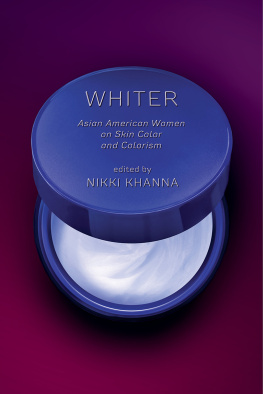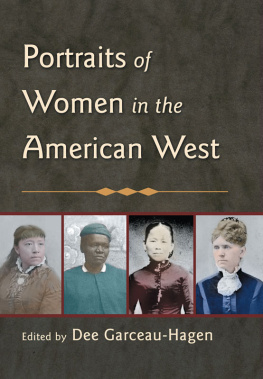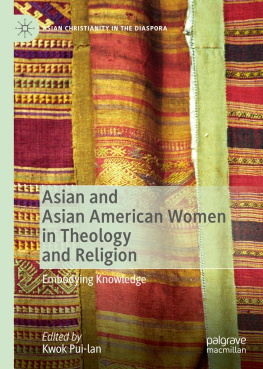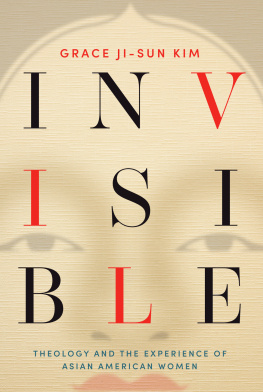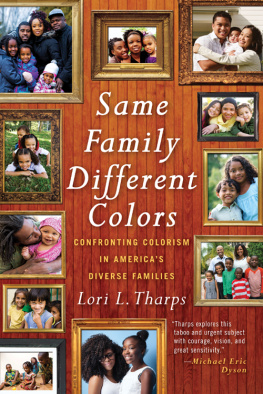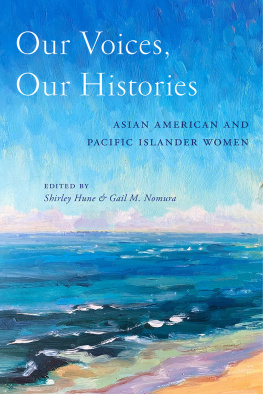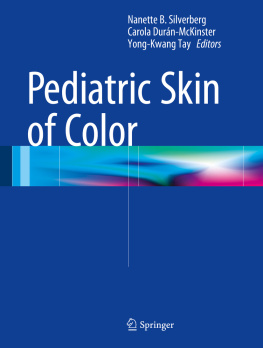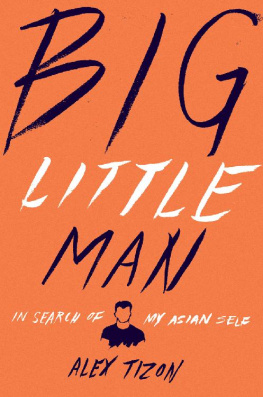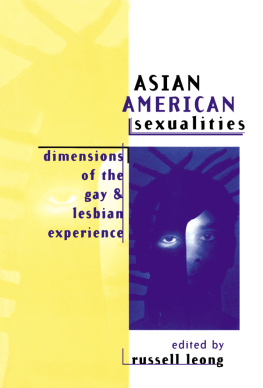
Whiter
Whiter
Asian American Women on Skin Color and Colorism
Edited by N IKKI K HANNA

NEW YORK UNIVERSITY PRESS
New York
NEW YORK UNIVERSITY PRESS
New York
www.nyupress.org
2020 by New York University
All rights reserved
References to Internet websites (URLs) were accurate at the time of writing. Neither the author nor New York University Press is responsible for URLs that may have expired or changed since the manuscript was prepared.
Library of Congress Cataloging-in-Publication Data
Names: Khanna, Nikki, 1974 author.
Title: Whiter : Asian American women on skin color and colorism / Nikki Khanna.
Description: New York : New York University Press, [2020] | Includes bibliographical references and index.
Identifiers: LCCN 2019012043| ISBN 9781479881086 (cloth : alk. paper) | ISBN 9781479800292 (pbk. : alk. paper)
Subjects: LCSH: Asian-American womenSocial conditions. | ColorismUnited States. | Race relationsUnited States. | RacismUnited States.
Classification: LCC E184.A75 K495 2020 | DDC 305.800973dc23
LC record available at https://lccn.loc.gov/2019012043
New York University Press books are printed on acid-free paper, and their binding materials are chosen for strength and durability. We strive to use environmentally responsible suppliers and materials to the greatest extent possible in publishing our books.
Manufactured in the United States of America
10 9 8 7 6 5 4 3 2 1
Also available as an ebook
For my daughter, Olivia Savitri
maganda beautiful
I gathered
my role models
from television shows
some spoke my language
but had skin
lighter
than mine.
thats what youre
supposed to look like,
Society whispered
in my ear
heres how you get there,
look over here,
see, this is ideal
white
with a dash of
exotic
and a surfer boy
on my arm
waves of blonde.
that is what
I want.
Cheyanne Ramn, F ILIPINA A MERICAN
Contents
Nikki Khanna
Rhea Goveas, Indian American
Miho Iwata, Japanese (Permanent US Resident)
Catherine Ma, Chinese American
Sambath Meas, Khmer American
Ethel Nicdao, Filipina American
Tanzila Ahmed, Bangladeshi American
Bhoomi K. Thakore, Indian American
Rhea Manglani, Indian American
Rosalie Chan, Chinese/Filipina American
Julia Mizutani, Multiracial Japanese/White American
Sonal Nalkur, Indo-Canadian (Currently Resides in the United States)
Brittany Ota-Malloy, Multiracial Japanese/Black American
Noor Hasan, Pakistani American
Agatha Roa, Pacific Islander American
Noelle Marie Falcis, Filipina American
Sairah Husain, Pakistani American
Wendy Thompson Taiwo, Multiracial Chinese/Black American
Marimas Hosan Mostiller, Cham American
Anne Mai Yee Jansen, Multiracial Chinese/White American
Kim D. Chanbonpin, Filipina American
Kamna Shastri, Indian American
Erika Lee, Taiwanese/Chinese American
Cindy Luu, Vietnamese American
Joanne L. Rondilla, Filipina American
Daniela Pila, Filipina American
Lillian Lu, Chinese American
Rowena Mangohig, Filipina American
Julia R. DeCook, Multiracial Korean/White American
Kathy Tran-Peters, Vietnamese American
Betty Ming Liu, Chinese American
Nikki Khanna
Whiteness will make you win, she tells me.
She smiles brightly before my screen, and I watch as she tries to sell me a skin-whitening pill in a fifty-second Thai commercial. I can only see the Asian actress from the shoulders up, though from her face I can easily see that she is strikingly attractive, with ebony hair and porcelain skin. I glance down at my own skin, quickly comparing our skin tones. Without the pill, she warns, the whiteness she has invested in will vanish, and as if to illustrate her point, her skin slowly fades to black and her on-screen expression turns despondent and depressed with each darkening frame. The product name, Snowz, aptly chosen to evoke whiteness, reminds me of the flakes that fall from winter skieswhite, pure, nearly translucent. The skin of the second model in the commercial, perhaps like snow, is bright and white as she beams with a cheery smile before my computer screen; apparently she has invested in the dietary supplement of glutathione that will prevent her, as the ad claims, from becoming a faded star. Her light skin and wide grin are in direct contrast to the gloomy, black-skinned model next to her. I am simultaneously captivated and disgusted by the ad, the juxtaposition of light and dark and smiles and frowns, the unapologetic and explicit racism. I am immediately taken back to my childhood.
Far from Thailand, or anywhere in Asia for that matter, I grew up in suburban Atlanta in the 1980s. As a child, I often spent weekends with my parents and younger brother at the local Indian grocer, standing among displays of colorful Indian sweets, brass statues of Hindu gods and goddesses, and imported tubes of whitening creams and bars of whitening soap stacked ever so neatly on store shelves. Like the two Thai actresses in the Snowz commercial, Indian models, all light-skinned and nearly white, smiled to me from every package and tube, promising total fairness and complete whitening. As a child waiting in busy check-out lines, impatient and often bored to tears, I would occasionally occupy my time by checking my skin color next to the seven shades of the expert fairness meter printed on the side of a Fair & Lovely package. Strategically holding my arm next to the box, I felt satisfied when I found my shade; it most closely matched the second-lightest skin swatch. I smiled.
Growing up in the Indian American community, and as a mixed-race-part-white child at that, I already understood the value of having light skin.
***
The 2016 online Snowz advertisement was heavily criticized both within and outside of Thailand for its blatantly racist message and was promptly pulled by its parent company, though skin-whitening products like Snowz and Fair & Lovely remain popular throughout Asia and around the world, and are only the tip of the iceberg. Skin whitening (also called skin lightening or skin bleaching) is a multi-billion-dollar global industry that promises consumers translucent, bright, fair, and white skin through moisturizers, foundations, night creams, anti-aging serums, sunscreens, lip balms, face washes, soap bars, facials, foot creams, deodorants, and even feminine washes, pills, laser treatments, and whitening injections. Light-skinned, near-white models peddling products with names like Snowz, Fair & Lovely, Bright, White Perfect, White-Light, Lightenex, Whitenicious, Fairever, White Beauty, CyberWhite, Refined White, DiorSnow, Snow UV, and Blanc Expert conjure images of whiteness and its explicit link to beauty, flawlessness, and femininity. The product tag lines, too, reinforce the message that white is beautiful and read like musty artifacts from a bygone era: From Ebony to Ivory (Glutamax), Whatever Keeps My Skin the Purest White (Birds Nest), Reveal Your True Inner Fairness (LOreal White Perfect), Turn Down the Dark, Turn Up the Bright (Elizabeth Arden), and Dark Out, White In. Increase Your Face Value (Ponds White Beauty Facewash).
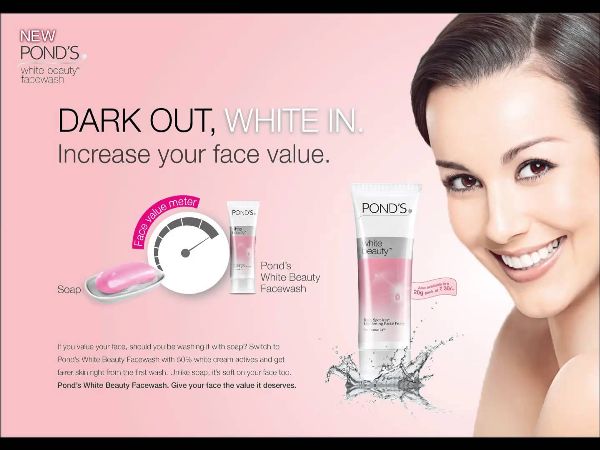
Next page
